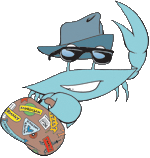

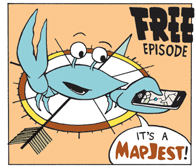

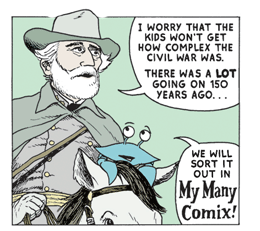
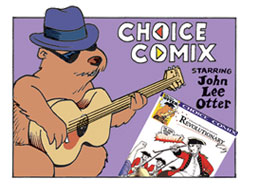
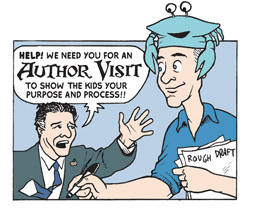

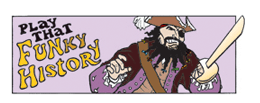

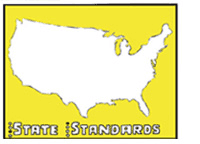


|
|

|
 |
||
 |
"My students love the comix. Our 5th grade teachers should buy Slavery's Storm and Go West, Young Crab, which support their curriculum and Georgia's standards." --Patricia, 4th grade teacher from GA |
|
|
|
||
Archive for the ‘literacy’ Category
More teacher's guides for free
Written on Friday, July 23rd, 2010 [permanent link]Jump on over to http://www.chestercomix.com/teaching-guides to get the free pdf download of the teacher’s guides for my comix “First Americans,” “Revolutionary Rumblings,” and “War for Independence.”
These additions to the teacher’s area of the website mean almost all my comix now have free teacher’s guides here at Chester’s home on the web. (Because I’m finally running out of the printed versions — and am gaining back some closet space in my house!!) There are many other free teacher resources on the web, but I think the Chester Comix guides do quite well in comparison. Most of the other resources I see are completely text and skimpy on any material you would present directly to students. My guides are broken into distinct sections, have a lot of visuals and have material to directly help both teachers and their students.
Plus, they have quizzes!! I know, I know, the kids don’t like that. But I try hard to craft a light-but-firm tone with them so that these assessments aren’t as heavy as a full-blown standardized test practice but still give the students experience with those kinds of questions. (“Which of the following did Europeans NOT trade for West African gold?”)
These teacher’s guides are packed with the wisdom and work of a dozen real-world classroom teachers who helped me when Chester ran as a newspaper feature for five years. They taught me a lot, and I still hear their guiding voices every time I sit down to draw a new story to help more students.
And their teachers.
Tags: Chester the Crab, educational comics, teachers guide
Posted in History Teacher, literacy | 1 Comment »
Reading comix boosts vocabulary
Written on Thursday, April 8th, 2010 [permanent link]Here’s a cute and personal take on the many studies that have shown comix boost the vocabulary and reading comprehension skills of young readers. (You know, like reading just about ANYTHING boosts vocabulary and reading comprehension skills!) This blog on NPR’s website falls apart at the end, as the writer strays from the vocabulary theme and gets into a bunch of obscure comic book themes that, well, OK, I GET, but they aren’t important to his main point.
PS – Interesting to me that he is almost exactly my age. I still remain devoted to Sesame Street and the teaching power of simple and bold ideas. Like comix!
Tags: Bentley Boyd, Chester the Crab, comic books, educational comics, literacy, reluctant readers, vocabulary
Posted in literacy | No Comments »
Comics boost literacy (like any children's picture book does!)
Written on Sunday, November 15th, 2009 [permanent link]The www.sciencedaily.com web site recently had a good overview of comix-and-literacy by Carol L. Tilley, a professor of library and information science at Illinois. Her analysis matches the points I try to get across to teachers and librarians and parents: that comics are just as sophisticated as other forms of literature, and children benefit from reading them at least as much as they do from reading other types of books.
If reading Dr. Seuss to kids at age 5 is good, then it’s good for that same kid to read Spider-Man at age 10. Comix shouldn’t be the only thing kids read, but if it’s the favorite form of reading for a child who would otherwise be playing a video game or watching TV, then let’s keep comix near him!
Why do we assume that reading a chapter book with no pictures is the highest form of literacy? A book without visual images does not look like the world I live in — a novel is actually an artificial construction, cutting off most of the information we use to navigate the real world (visuals, sound, interplay in conversation . . . ). In their own way, novels-without-pictures are as much an artificial environment as any video game — and can be as fun and as worthwhile to dive into as any video game, but why do we as a culture continue to assume that novels are superior to other forms of media?
Soon, articles like the one I’m linking to won’t appear because the category lines in children’s literature will have blurred so much. I try to blur that line in my author’s talks to students and in my teacher in-service training programs. I ask people to compare the page layout of a children’s book with pages from comix, and, like Tilley here, we can see the distinct comic book tools — frames, thought and speech bubbles, motion lines — being co-opted by children’s books, creating a hybrid format.
Here’s the whole article:
www.sciencedaily.com/releases/2009/11/091105121220.htm
Tags: Bentley Boyd, Chester Comix, Chester the Crab, comic book, literacy
Posted in literacy | No Comments »


